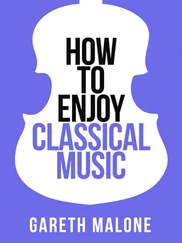STEPHEN FRY - OF CLASSICAL MUSIC
Здесь есть возможность читать онлайн «STEPHEN FRY - OF CLASSICAL MUSIC» весь текст электронной книги совершенно бесплатно (целиком полную версию без сокращений). В некоторых случаях можно слушать аудио, скачать через торрент в формате fb2 и присутствует краткое содержание. Жанр: на английском языке. Описание произведения, (предисловие) а так же отзывы посетителей доступны на портале библиотеки ЛибКат.
- Название:OF CLASSICAL MUSIC
- Автор:
- Жанр:
- Год:неизвестен
- ISBN:нет данных
- Рейтинг книги:5 / 5. Голосов: 1
-
Избранное:Добавить в избранное
- Отзывы:
-
Ваша оценка:
- 100
- 1
- 2
- 3
- 4
- 5
OF CLASSICAL MUSIC: краткое содержание, описание и аннотация
Предлагаем к чтению аннотацию, описание, краткое содержание или предисловие (зависит от того, что написал сам автор книги «OF CLASSICAL MUSIC»). Если вы не нашли необходимую информацию о книге — напишите в комментариях, мы постараемся отыскать её.
OF CLASSICAL MUSIC — читать онлайн бесплатно полную книгу (весь текст) целиком
Ниже представлен текст книги, разбитый по страницам. Система сохранения места последней прочитанной страницы, позволяет с удобством читать онлайн бесплатно книгу «OF CLASSICAL MUSIC», без необходимости каждый раз заново искать на чём Вы остановились. Поставьте закладку, и сможете в любой момент перейти на страницу, на которой закончили чтение.
Интервал:
Закладка:
REBIRTH
A
round ten years before the medievalists got thrown out of the pool in 1450, the local paper in Conde, in Hainaut may have announced the birth of one Josquin des Pres. JDP was possibly the biggest talent of his age, and, in an era when very few were actually feted while they were still alive, he was hailed as a bit of a genius, with even Martin Luther being moved to comment: 'He is master of the notes: others… are mastered by them.' Bit dramatic, Martin, but still, I get your point. In his day, he was often known not by his full name, but simply by the one word Josse, or even Joseph. No doubt had he been around today, he may have gone one step further and done away with the name altogether in favour of a strange squiggle. Something like:
I
– the artist formally known as Josquin There. Quite preposterous, isn't it? And no doubt, as a result, it would catch on. In Josquin's day, though, it would, hopefully, have been frowned upon. And when was Josquin's day? Well, to put him into context, he was born some twelve years after Leonardo da Vinci, and was probably much more famous than the Mono, Lisa. Certainly, he died ten times as happy, by all accounts, having made himself quite well off and become the Canon of Conde. He died a couple of years after Magellan left his house in Seville with the words, 'I'm just popping down the shops.' In Josquin's lifetime, Michelangelo started work on the Sistine Chapel, while in England the Tudors came to power, and the finishing touches were put to the palace at Hampton Court.
There's one thing that's always bothered me about Josquin. Or should I say Josquin des Pres? Or should I say, Mr Pres? Or Mr Des Pres? And that is… well, those last two lines. Where does he come in a music dictionary? Nobody can seem to agree. I know, I know, it may seem a tiny point, but it really annoys me to look him up in one book under Pres, only to be told in rather curt fashion 'See Josquin'. Well, why, for goodness' sake? You don't look under Beethoven and find the words 'Bugger off and look under Ludwig.' Then you check a different book under J and you're told 'See Des Pres.' And then 'See Pres.' Ooh, it really gets my goat. Tiny point, I know, but, well, the devil is in the detail, as they said when Beelzebub went to do his National Service.
JDP, Mr des Pres, Josquin, «L - whatever you want to call him -strikes me as quite a sorted individual. While he was young, he travelled a lot, eventually entering the Pope's service for about thirteen years till about 1499. During that time, and even over the next twenty or so years, till his death in 1521, he was a big influence on music generally. His Masses are important because they began to break free from an absolute strict adherence to rules. In his settings, Masses began to express the spirit of the words. This might seem like nothing at all, now, but music then was as much a discipline as a pleasure. JDP freed himself from an almost pedantic obedience to the rules and, well, let his hair down a little. And, as a big influence, he was lucky enough to be at the beating heart of music at the time. This wasn't the court of Louis XII in France, although he was there. It wasn't the court of Emperor Maximillian I, either, although he was there for a time, too. And it wasn't really the diocese of Conde where he spent his final years as Canon. No. The beating heart of music at this time was, quite simply, the Church.
JOS YOU, JOS ME…
L
et me skip on a few years from Josquin's death in 1521. Rather like a submarine, I'll submerge for a few years and come up in 1551. Let me try and briefly fill you in on what was going on at sea level. Henry VIII has been through all six wives, and finally shuffled off himself. If you believe his PR man, he also left us the song 'Greensleeves', although this is open to doubt. Edward VI is now the boss. Over in France, Nostradamus has issued his first set of predictions. In his lifetime, he was said to have predicted that Hitler would come to power, that Ronald Reagan was the devil, and - one that I found myself only the other day when I was leafing through - the fact that David Beckham would break his second metatarsal just before the 2002 World Cup/
What else? Well, court jesters - the sixteenth-century version of stand-up-^ - are the new rock and roll across Europe. Titian is the favoured artist of those in the know, and, perhaps most importantly, the pocket handkerchief has come into common use in a big way. So far, I have been unable to determine whether deckchairs and rolled-up trouser legs came into vogue at the same time.
But to 1551, and there is big news. A man called Palestrina has been made the director of music at St Peter's in Rome. It was a quite fortuitous turn of events for the twenty-five-year-old composer. Palestrina had been organist and choirmaster of his local cathedral for the last seven years. Then, in 1551, the bishop whom he had been supplying with cute little Masses every week suddenly wasn't a bishop any more. He was a Pope. Totally different. Within days, Palestrina was installed as choirmaster of the Julian Chapel at the Vatican, under the new pope, Julius III, and Palestrina was busy telling eveyone 'we go way back.' Now, today this may not seem particularly important in the scheme of things, you might say. On paper, after all, it's only 'man gets Church job'. But in 1551, music was the Church, and virtually everyone wrote not just for it but also by order of it. A lot of them considered it their duty - thoughtful, well-educated men (because it almost always was men) who often decided that God had given them this gift of music, therefore they had to repay him, by dedicating their work and often their life to him. Add to this the fact that the Church's motto at fi Pretty sure that's what he meant by 'a prince with a clubfoot3. P PMost popular joke of the???: 'I wouldn't say my wife was fat… but when they put her on the ducking stool, there was a tidal wave in Shrewsbury… nay, verily, but seriously, good people…' this time appeared to be something like 'Scium Quo Habitas' - 'We Know Where You Live' - and, well, it's not surprising to find that lad majorem deigloriam' appeared on many a front page.
And here's another thing: not only does MUSIC = CHURCH at this point, but also, MUSIC = SINGING. Now why is that? Why was more or less all music composed by these Church-loving composers at this time vocal?
I'm glad you asked me that, as politicians are prone to saying, because I'm not going to answer it. I will in a moment, but first back to Palestrina.
FILL THE SPACE
,3 adly for Palestrina, within a few years of being given the top job in Rome, he was out on his ear, kicked out by the incoming new top doge, Pope Paul??, who clearly didn't like the cut of his cassock. Happily for Palestrina, though, his time would come again, a few years later, reinstated by yet another different Pope. I don't know. How did they cope with all this coming and going? Maybe this was the model for Italy's political system. Anyway, regardless, Palestrina enjoys his new period of favour, and immediately starts doing what everyone around him was doing too. Lassus^ was doing it, Byrd was doing it in England - everybody was doing it - and that was writing music for the amazing spaces that were these huge cathedrals. Yes, I know, this might sound obvious, but it needs saying. These cathedrals, in their own way, changed the face of music for a time, because everyone wrote in order to sound good in them. And just the smallest knowledge of acoustics will tell you that writing music for, say, a concert in your local village hall and writing music to fill the enormous caverns of St Peter's in Rome are two very different exercises.
The cathedrals had gone up as huge, unmissable symbols of how great it was to be a Christian, and the Church went around throwing fi Orlande de Lassus, a well-travelled and much favoured composer. Worked all over - Naples, Sicily, Antwerp, Bavaria, Munich - the boy done well. Wrote some 1,200 works in all, including some of the most important Masses of his day. money at the sweet problem of getting the best people possible to fill them with beautiful sounds. Palestrina no doubt felt like the cat who'd got the cream, the cream being St Peter's. And this is important, because Palestrina (whose real name, by the way, wasn't Palestrina at all - Palestrina was the small Italian town he came from; all we know of his name is that he was called Giovanni Pierluigi) was NOT an innovator. He was NOT a pioneer. Admittedly, throughout this book, we will celebrate many people who were innovators and pioneers, but Palestrina was not one of them. He was more concerned with writing sheer, beautiful noises that would sound fantastic in the Pope's local church. Music like his glorious Missa Papae Marcelli - the Mass for Pope Marcellus, a gorgeous piece of polyphony written specifically not to advance music into the next century, not to shock people into the next era, but simply to sound unutterably gorgeous as it bounced off the walls of the Vatican, taking, no doubt, minutes to fade as it did so. Divine.
Читать дальшеИнтервал:
Закладка:
Похожие книги на «OF CLASSICAL MUSIC»
Представляем Вашему вниманию похожие книги на «OF CLASSICAL MUSIC» списком для выбора. Мы отобрали схожую по названию и смыслу литературу в надежде предоставить читателям больше вариантов отыскать новые, интересные, ещё непрочитанные произведения.
Обсуждение, отзывы о книге «OF CLASSICAL MUSIC» и просто собственные мнения читателей. Оставьте ваши комментарии, напишите, что Вы думаете о произведении, его смысле или главных героях. Укажите что конкретно понравилось, а что нет, и почему Вы так считаете.










